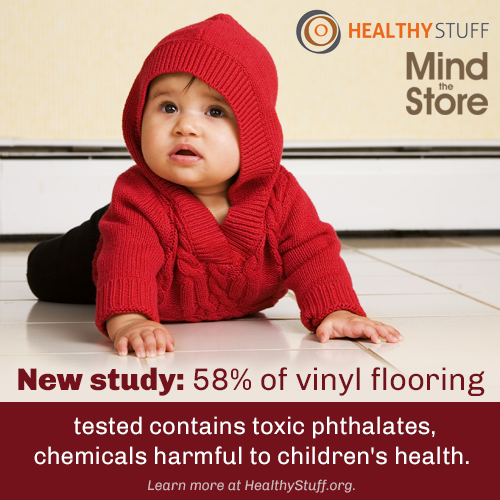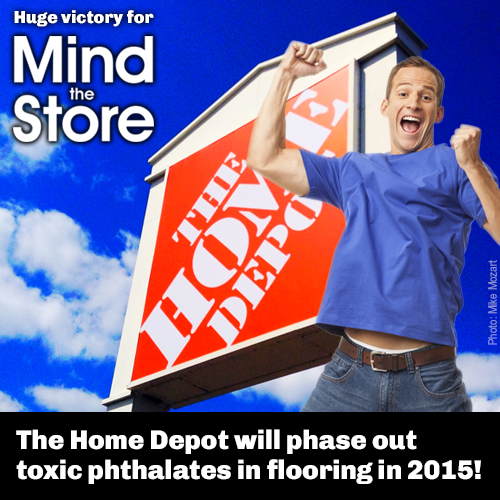People love their vinyl flooring for its resilience and cost. In fact, Floor Weekly reported 2011 sales for vinyl sheet and tile flooring “hit a record high wholesale value of $2.11 billion” in the United States. However, that resiliency comes with a health price tag. Phthalates are added to vinyl flooring to reduce the rigidity of PVC and make it pliable. The Ecology Center recently tested sixty-five vinyl flooring products from several major home improvement centers. Fifty-eight percent of the flooring tested contained phthalates. This additive is a well-known reproductive and developmental disruptor.
Phlthalate exposure comes from breathing in dust from flooring.
Joe Thornton, Ph.D., Professor in the Center for Ecology and Evolutionary Biology at the University of Oregon states in his 2002 report
“Phthalates are organic chemicals used to make vinyl plastic flexible, and they can make up a large portion—up to 60 percent by weight—of the final product. Flexible PVC—including flooring and wall coverings—accounts for just more than half of all vinyl demand, while the remainder is rigid, unplasticized materials like pipes and siding.”
Worse yet, according to the CDC, measurable levels of phthalate exposure exist in the general population. Consequently, children are most at risk. Mothers can expose both their unborn children and born children. Unborn children are exposed to the chemical since it passes through the placenta via the exposed mother. Phthalate exposure can occur during breastfeeding.
Tests Results:
Home Depot agreed to phase out flooring that contains phlthalates by the end of 2015. Lumber Liquidator stated it is working with its supplier but did not set a deadline. On the other hand, Lowes, Ace Hardware, and other retailers have not issued a statement.
Of the flooring tested, listed below is the percentage of flooring that tested positive for phthalate.
- 100 % of Lumber Liquidators and Ace Hardware
- 48% of Lowes’ products
- 23% of Menards
- 25% of Build.com
- Armstrong and Designer’s Images had zero levels in the surface layer.
I am not a fan of PVC.
Before I go further, I am not a fan of PVC or “vinyl” flooring with or without phthalates. Vinyl chloride, the chemical used to make PVC, is a known human carcinogen. Workers and areas surrounding the manufacturing of PVC are at risk for exposure to this chemical that contaminates water, soil, and air
In addition, the production and incineration of PVC release dioxins. Dioxins cause a host of health problems including birth defects, cancer, developmental delays, and diabetes. 95% of the doxins released during manufacturing or incineration accumulate in animal fat. When humans eat animal products that contain dioxins, the chemical accumulates in human fat.
As mentioned above, PVC can contain phthalates.
Opt for cork flooring, wood, tile, or Marmoleum instead.
But What about the Replacement Chemicals?
When I heard that phthalates were being replaced with different chemicals, I asked with what? Sometimes horrible chemicals are replaced with the equally terrible ones. (Case in point, BPA has been replaced with BPS.)
Healthy Building Network studied six bio-plastic phthalate alternatives, summarized that Grindsted Soft-n-Safe (made by Danisco/DuPont) and Polysorb ID 37 (made by Roquette) are the least toxic.
The following companies listed on Healthy Building Network who use Grindsted Soft-n-safe:
- Tarkett IQ Naturals
- UpoFloor Hovi Quartz
- Podium Naturale
The following company listed on HBN who use Polysorb ID 37:
- Gerflor Mipolam Symbioz
Just a Word about Confusion Over the word, “vinyl.”
Note, not all “vinyl” building products such as adhesives, shower curtains, safety glass, etc. are made of PVC. (See HERE to distinguish between PVC and other types of vinyl such as PEVA, EVA, and similar chemicals.) You should always ask what are the materials in the vinyl product. Realize that those alternative chemical compositions may not be as harmful to the Earth as PVC, but they do have consequences. Healthy Building Network states:
“There are still plenty of toxic challenges and untested chemicals in the life cycle of any petrochemical product. As is the case with most other polymers competing with PVC, however, the weight of available evidence indicates that the absence of chlorine in the formula will generally render the lifecycle environmental health impacts of PVB and the other vinyl less harmful than PVC and initial study is bearing this out. Like the polyolefin plastics, the use of PVB and the other non chlorinated vinyls represents a step forward in the search for alternatives to PVC.”
Tell Lowe’s to follow Home Depot’s lead.
Lowe’s is the second largest home improvement chain. As mentioned above, they haven’t issued a statement about phthalates in flooring.
Please join me and ask Lowe’s to follow Home Depot’s lead and remove flooring with phthlates from their stores. Sign HERE.
I will update this post as soon as find out alternatives that contain these less toxic plasticers.



green Bean says
Yikes!! I feel like every time I turn around, there is more bad new about toxins in stuff we encounter daily. Thanks for the information. Pinning.
Anna@Green Talk says
Green Bean, I hear ya.
Judith Nasser says
my native language is not English so I would appreciate to simple know which are the name of the brand of floors is better to buy to prevent toxic.
Anna@Green Talk says
Judith, take a look at the bottom where I bullet point flooring that is okay. If you are still having trouble, email me on my contact page. Anna
diane says
I am trying to redo the whole house in wood or tile. Most of it is carpet right now which I hate. Very hard to clean. But, floors are pricy so it is a slow process!
Anna@Green Talk says
Diane, I know. Even tile can be pricing when you figure in installation. Anna
avinash b karnik says
Another culprit is FORMALDEHYDE, a proven carcinogen.
Have you noticed headache or bad health just after shifting to new home?
It could be because of furniture or flooring containing Formaldehyde.
You may visit the site or watch the clip:
Indoor Air Quality
http://enhs.umn.edu/current/51.....ehyde.html
Formaldehyde testing
https://www.youtube.com/watch?v=MkUFBopGF18
Avinash B Karnik, CHMM
karen says
I think vinyl flooring is ugly. But that’s just me. I rather go with bare concrete with area rugs if I had a choice. My parents put vinyl in their basement. And I’m sure they have phthalate and formaldehyde and God knows what else. This was done all before we knew about their toxicity. And I wonder why my mom has MCS….especially to formaldehyde.
Rebecca says
I didn’t know that phthalates could make up such a large portion of a finished product!! I’ve been researching toxins like phthalates in skin care and shower products, and the common line of defense is “these chemicals are safe below a certain threshold”. (But if they bioacculate, and we use a dozen sources of them before 9am, then we’re not getting the supposedly safe tiny amount, but much much more. And if they’re making up 60% of our floors, then they’re not safe.) I am definitely going to look at flooring differently from now on. Thanks for the informative post!
Anna@Green Talk says
Rebecca, I was shocked too. People don’t associate phthalates with building products. Anna
Sophie-SCHF says
Thanks for your post! It’s so good to know about toxics in our homes, especially when they’re so everyday like our flooring.
Betsy (Eco-novice) says
This is such a useful post, Anna! Sharing with my sister who is thinking about buying a “phthalate-free” vinyl floor.
Anna@Green Talk says
Betsy, thanks. I am glad you liked the article. I couldn’t stop at simply telling people to buy a phthalate free vinyl flooring since not all the alternative options are okay.
Peggy causey says
Is here a test that you can do on vinyl plank flooring to see if it is toxic
Doreen Austin says
I’m wanting to buy vinyl plank flooring but I’m nerves that there maybe toxic gas (VOC) and or other bad chemicals in it. Can you suggest a company or help in any way. thank you
Anna@Green Talk says
Doreen, I listed in the article some companies that are using better quality components. I would check out those floors. Ask to take home a large sample and let it sit in your house. See if you smell anything from the sample. Personally, I shy away from vinyl flooring. It isn’t worth the risk. Anna
Sharee Thornberry says
Do the toxic chemicals wear off after time?
Anna@Green Talk says
I think some off-gas but I really don’t know about the phthalates. I don’t think they go away.
Holly says
Our Home is 5 years old with hardwood , tile and Vinyl flooring in KItchen. A big mistake ! my husband and I now have lead poisoning. Will be removing it to put in tile, and what a chore. Do Not trust vinyl. Its off gassing into air and the air we r breathing is toxic. Thanks to a Docters detection.
Tara says
I do not see the list of flooring that is okay. Please let me know how to access it.
Anna says
Tara, there were very few approved companies listed. I mentioned the ones above in the article and linked to this PDF: http://www.healthybuilding.net.....in-pvc.pdf.
Hope this helps. Anna
BRenda Tremblay says
I just installed a Parkhill PKH345 waterproof luxury vinyl tile floor by Earthwerks my entire one bedroom condo. Now I find out that this flooring
contains phthalate!! I decided to use the product from Earthwerks because they claimed to be a “green” company, I am now worried that I should have
chosen tile instead but this flooring was too expensive to change. I have only
had this flooring for one month!! Do you know anything about Earthwerks or
if I might have any recourse? Thanks
Anna says
Brenda, they are a Floor score certified product. Ask them if their product contains phthalates. It might not. If it doesn’t, ask them what they used to soften the PVC. Compare that answer to the study. Their certification doesn’t include the issue of phthalates. This is a tricky situation because this is only one study. They can say that the study is invalid, etc. Anna